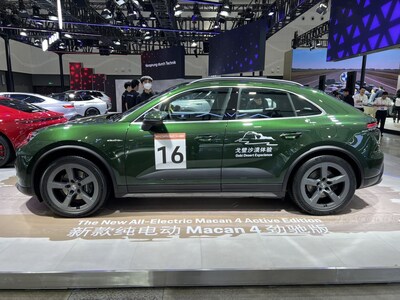
HAIKOU, China, Sept. 30, 2025 /PRNewswire/ — “I firmly believe that the number of new energy vehicles (NEVs) will continue to rise very dynamically in China, but also in other regions of the world,” Hildegard Müller, president of the German Association of the Automotive Industry (VDA), told Science and Technology Daily in an interview during the 2025 World New Energy Vehicle Congress (WNEVC), held in Haikou, Hainan province in south China, from September 27 to 29.
The global NEV market is growing quickly. In the first half of 2025, global sales of NEVs reached a new high of more than 9.7 million, increasing by 31.3 percent year on year. Over 6.9 million NEVs were sold in China, a surging 40.3 percent year-on-year increase and a market penetration rate of 44.3 percent, said Wan Gang, president of the China Association for Science and Technology and president of WNEVC, in his keynote speech at a plenary session.
However, continuous significant growth of the NEV market will not be easy as there are many issues to be addressed.
Exploring paths for green transformation
NEV50@2035 was a key consensus proposed at the first WNEVC in 2019, aiming to achieve a 50 percent global share for NEVs by 2035.
An essential prerequisite for continuously significant growth of the NEV market is the infrastructure, such as power grids, charging stations, electricity prices for charging, and other issues, according to Müller.
Wan also pointed out that efforts should be made to accelerate the deployment of distributed new energy power generation and on-site hydrogen refueling along highways.
Pure electric vehicles (EVs) have become the mainstream choice in the market, but adopting multiple technological paths, including EVs, plug-in hybrids, and fuel cell EVs, is essential to the future development of the NEV industry, according to the professionals attending the conference.
Global NEV transformation cannot rely only on a single technology. Regional variations in energy, infrastructure and market demand require complementary technology pathways, Müller said.
This was also echoed by Wang Xiaoqiu, chairman of SAIC Motor Corporation, who pointed out the unique advantages fuel cell vehicles possess —clean efficiency and extended range—in specific scenarios like long-distance heavy-duty transport and commercial vehicles. Besides, the strategic value and long-term potential of fuel cell vehicles in ecological decarbonization cannot be overlooked.
The development of batteries is also a major issue. Wan suggested stepping up innovation of intrinsically safe, all-weather, high-specific energy liquid-state batteries, and establishing rules and systems covering battery production, recycling, echelon utilization and reuse to form a traceable and recyclable closed-loop system throughout the entire life cycle of batteries.
Battery life cycle management and recycling systems are increasingly critical from the environment, social and governance and long-term sustainability perspectives, Müller said, adding that well established recycling frameworks elevate raw materials pressure and reduce the carbon footprint.
Talk of competition, work in cooperation
Dealing with these complicated issues needs joint efforts, and trade protectionism is not going to help.
“The automotive industry is a highly globalized sector. We should jointly uphold the multilateral trading system, eliminate trade barriers, and promote the formation of a fair and transparent international market environment,” Wang said.
Müller said the German automotive industry criticizes the tariffs imposed by the European Union on cars produced in China.
The four-decade cooperation between China and Germany in the automobile industry proves that it is not all gloom and doom. The collaboration has now extended to the NEV sector and autonomous driving. Volkswagen and the JAC Automobile Group have established an NEV joint venture in Anhui province in east China, while Geely Auto has opened an R&D center in Raunheim, near Frankfurt Airport in Germany.
Mercedes-Benz has recently announced its collaboration with Bytedance, the parent company of TikTok, and will soon launch a new intelligent driver assistance system with the Chinese autonomous driving startup Momenta, according to Oliver Thöne, member of the Board of Management, Mercedes-Benz Group AG, responsible for Greater China.
The relationship between German and Chinese companies is based on mutual trust and partnership, Müller said. “We always talk about competition, but at the same time we also cooperate, as was recently demonstrated at the IAA Mobility event in Munich, where many companies from Germany and China presented cooperation projects.”
As the current developments pose a major challenge, it would be better if companies join forces and share this challenge, Müller said. “In this respect, we welcome any initiative that focuses on cooperation, whether here in China or about jobs in Germany. I believe that this is exactly what we need in the future. It is an optimal situation for all companies and is expressly supported by the VDA.”
Xiong Jijun, China’s vice minister of industry and information technology, said the ministry will deepen international cooperation and strengthen mutual recognition of international standards and alignment of rules, creating a better environment for the globalized development of the NEV industry.
View original content to download multimedia:https://www.prnewswire.com/news-releases/cooperation-call-at-nev-congress-to-boost-green-transformation-302571076.html
SOURCE Science and Technology Daily




